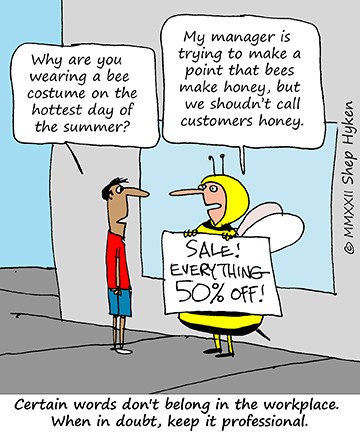 Server Calling Customer Honey
Server Calling Customer Honey
The other evening, a casual dinner with friends turned into an unexpected lesson in workplace etiquette. As we placed our orders, the young server, barely out of high school, addressed my wife with a seemingly sweet, yet ultimately jarring, term: “Honey, what can I get for you?”
While the server meant no harm, and likely intended to be friendly, the term landed awkwardly. My friend, picking up on the subtle discomfort, turned to Cindy and remarked, “Doesn’t it bother you when people who aren’t your partner call you ‘honey’?”
Cindy’s reaction was measured but clear. “It’s not really appropriate,” she stated. “I’m not her honey.”
This simple interaction sparked a fascinating discussion around the table: What is truly acceptable to call customers and colleagues in a professional environment? Many of us have been on the receiving end of overly familiar terms like “honey,” “hon,” “dear,” “sweetie,” and countless others that, while not overtly offensive, definitely raise an eyebrow regarding their appropriateness. Personally, I tend to brush it off, but it does make you wonder – how do others truly feel about these overly affectionate names? It’s almost like being asked, “Honey, why are you calling me so late?” when the clock hasn’t even struck midnight – it feels out of place and a little jarring in the professional context.
Is “Honey” or “Sweetie” Really Okay in Professional Interactions?
Intrigued by the question of appropriateness, I turned to the internet and Googled: “Is it bad to call someone honey or sweetie?” The search results were overwhelmingly clear: outside the realm of personal relationships, these terms are generally considered inappropriate. Words frequently used to describe the reactions to such terms included “offensive,” “disrespectful,” “too informal,” “condescending,” and even “patronizing.” Some articles went further, suggesting that in a workplace context, using these seemingly affectionate terms could even be viewed as illegal, potentially leading to HR meetings, accusations of sexual harassment, and even termination. These terms, meant for intimacy and personal connection, simply don’t translate well to professional settings.
We are living in an age where political correctness is more than just a buzzword; it’s a crucial aspect of respectful communication. The language we choose when interacting with others, both customers and colleagues, requires careful consideration. While some individuals might be more tolerant of these terms of endearment than others, the workplace demands a higher standard of professionalism. Even if there is no malicious intent behind using “honey” or “sweetie,” it’s simply safer and more respectful to avoid them altogether. The potential for misinterpretation and offense far outweighs any perceived benefit of forced familiarity.
This concern extends beyond just “honey” and “sweetie.” It encompasses a broader understanding of what constitutes appropriate and inappropriate language in professional interactions. Cultivating a respectful and inclusive environment requires conscious effort and clear guidelines.
So, how do we shift away from these potentially problematic habits? The solution is surprisingly simple: training. A focused training session can lay the groundwork for understanding what is considered appropriate and inappropriate workplace language. It’s not rocket science, but rather about establishing clear expectations and providing occasional reminders to ensure these principles become ingrained in workplace culture. Investing in communication training is an investment in fostering a more respectful, professional, and ultimately, more positive environment for everyone.
Shep Hyken is a customer service/CX expert, award-winning keynote speaker, and New York Times bestselling author. Learn more about Shep’s customer service and customer experience keynote speeches and his customer service training workshops at www.Hyken.com. Connect with Shep on LinkedIn.